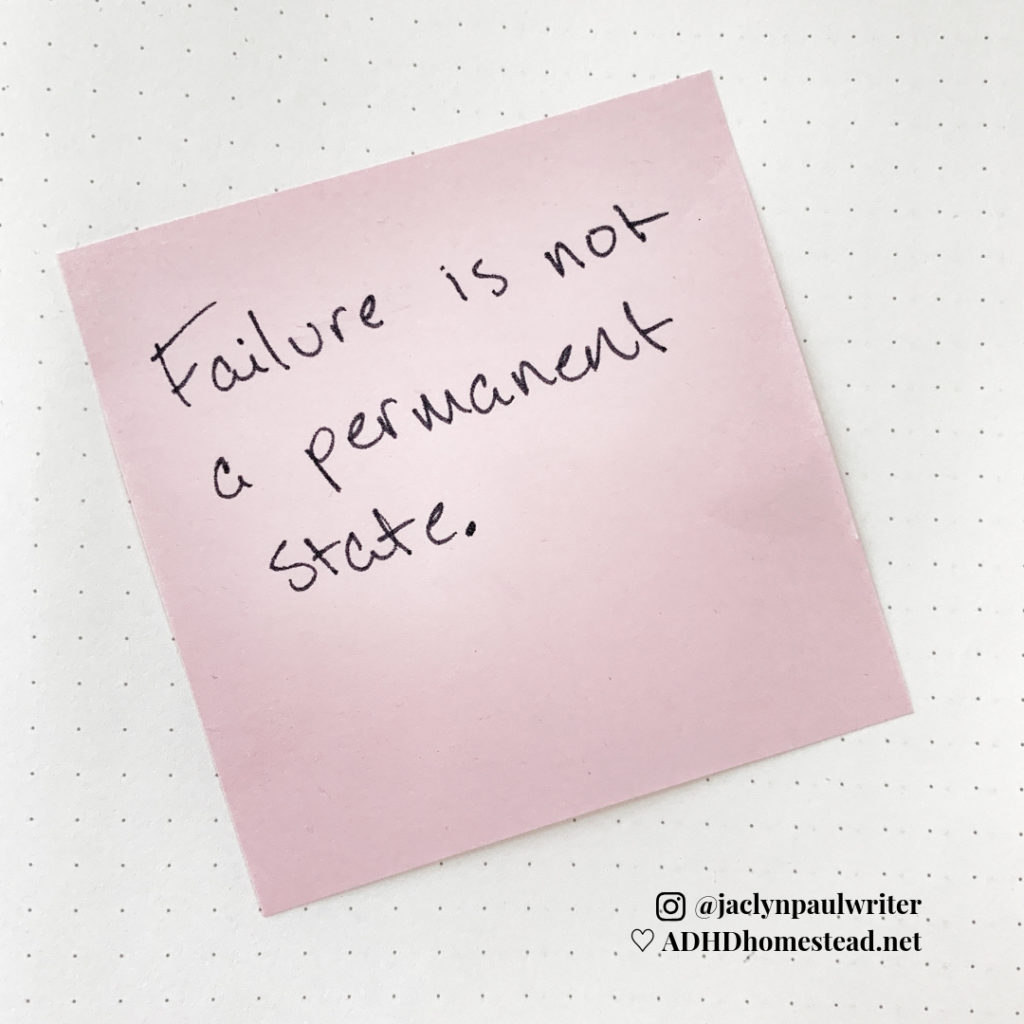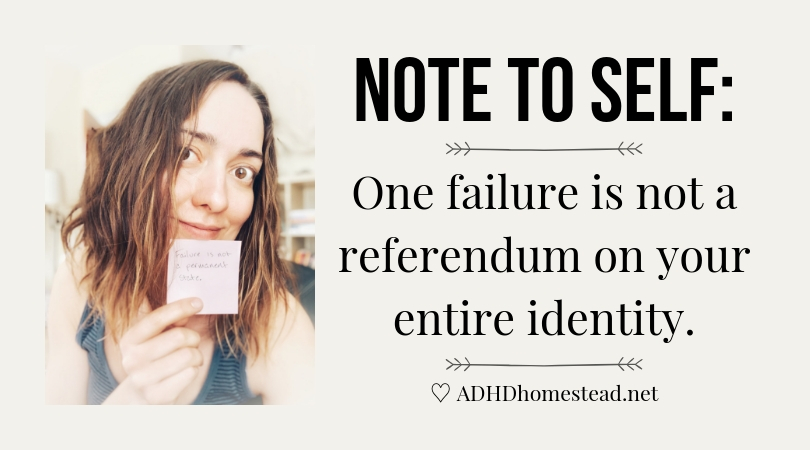Everyone experiences failure from time to time. I suspect we ADHDers experience more than our fair share.
Maybe that’s what leads us down a troubling path I see too often. People begin to see failure as inevitable, especially when it comes to getting organized. They’ll tell me “Nothing works” or “Yeah, I tried that [tool/app/system]. I loved it for a while but I couldn’t keep it up.”
But what does can’t keep it up mean? Does it mean every organizing strategy we try will eventually fall apart? Well, sure it does. That’s why I craft my systems with failure in mind. Because I don’t have a bulletproof solution to disorganization and I need to be able to press the reset button with minimal effort.
No one has a bulletproof solution. ADHDers don’t have a monopoly on chaos. Even the most organized person has a breaking point.
The real key to long-term organization and sanity lies in our response to failure. To the inevitable crash-and-burn periods of overwhelm. As we survey the wreckage, we can view failure as:
- A confirmation of our ineptitude, of the inevitability of failure, of the fact that nothing really works for us, of the fleeting nature of any success. Or…
- A temporary state, something we can recover from. Inevitable, yes, but an opportunity to learn and to gather important information.
It’s easy to believe ADHD consigns us to Option #1. It doesn’t.

Do you have a growth mindset or a fixed mindset?
What I described above is the difference between a growth mindset and a fixed mindset. Many of us develop these mindsets as children based on the feedback we receive from our parents and other adults.
To give a quick summary, some people view success as the result of effort. This growth mindset makes them more likely to take risks, to challenge themselves, and to view mistakes as opportunities to learn.
Others view success as the result of innate ability. Because of their fixed mindset, they hesitate to push or challenge themselves. They don’t want to risk failure, because failure means they aren’t good enough.
Psychologist Carol Dweck has studied the impact of praise and feedback on children’s mindsets. She found that children who received praise for traits like intelligence or natural talent were more likely to develop a fixed mindset. Children praised for effort and persistence developed growth mindsets. The growth-mindset group showed more resilience and outperformed the fixed-mindset group even after controlling for outside factors like IQ. All you have to do is look around to see how this mindset carries forward into adulthood.

Traits-based praise, ADHD anxiety, and imposter syndrome: a love story.
I got a lot of praise as a kid. People told me I was smart, a talented musician, a good writer. But we ADHDers know how easily this kind of praise can stab us in the back. You’re so smart can too easily precede imagine what you could do if you applied yourself.
While I got good grades and excelled on standardized tests, I never felt smart. My education catered to people whose brains worked like mine: linguistic, linear thinkers. I never had to work hard, and I felt awkward when people praised me for it.
ADHDers like me who get that gifted label early on can become very good at hiding our struggles. It was easy for me to develop a fixed mindset and stay well within my comfort zone. Wherever I showed natural ability, I quit before I had to work hard: advanced academic programs, flute lessons, field hockey, you name it. If I didn’t perform at the top of my cohort in one group, I found a different group where I did.
When I got my first self-directed job as an adult, I lived in constant fear of being found out — in large part because people always told me “you’re so organized” or “you’re such a good worker.” Any above-and-beyond level of organization I displayed was a coping strategy, not a talent. Praise felt misplaced. I always felt like I was hiding my true self and people would never respect me if they really knew me.
This constant anxiety defined much of my mid-20s before I started treating my ADHD. I’d spent my whole life being told I was so smart, had so much potential, and yet I always felt like I was on the brink of disaster.
We can embrace and learn from failure or we can let it close one door after another.
It’s really easy to feel defeated by failure and let it define who we think we are. Sometimes I still get stuck in a negative thought spiral about how having ADHD means I’ll always have to deal with X or Y shortcoming. I’ll never succeed at the level I want to. Any number of untruths. And when you experience the number of setbacks most ADHDers do, you can hardly blame us for letting it get to us every once in a while.
When I was a kid, my dad decided we needed a family calendar. He made one from a dry erase board and hung it on the pantry door. It soon became clear the system wasn’t working. I returned home from school one day to find the calendar laying in the side yard. In a fit of frustration, my father had torn it down and thrown it out the door. His calendar idea had been a complete bust.
Or had it? My mom, in many ways the polar opposite of my dad’s and my temperaments, went out and purchased a bigger dry erase board. She painstakingly applied strips of narrow black tape to turn it into a grid. This was before anyone sold prefabricated dry erase monthly calendars. She hung it up and assigned us each a different color marker on the calendar. At the beginning of each month, she erased and repopulated it. The system remained in place for the next 20 years.
Failure means the same thing for us as it does for everyone else: we need to troubleshoot. We can reframe our struggles as opportunities to investigate the cause and refine our coping systems. That’s the growth mindset, and it gives us the power to change our lives for the better.
The ADHD struggle is real, but it’s not an excuse to give up.
A reader wrote to me the other day to express excitement about my upcoming dothething.app. They felt so grateful that someone was developing a productivity app with executive functioning deficits in mind.
That perspective is important. It’s gratifying to see people understand and appreciate why I’m doing this work. To get back up again after a failure, we need a system that takes our brains into account.
But the failure itself matters just as much. Without it, we have no information. No clues. Nothing to tell us where we need to make a change or add more structure. Far from a permanent confirmation of our inadequacy, failure is an essential part of life’s natural fluctuations. It has a lot to teach us, if we can find the trust and courage to drop our defenses and listen. That’s what I’ve tried to accomplish in writing Order from Chaos, and what I hope to bring to a much more interactive platform with dothething.app.
Editor’s note: this post was updated to include audio narration on March 23, 2022.
Hey there! Are you enjoying The ADHD Homestead?
Here's the thing: I don't like ads. I don't want to sell your attention to an advertising service run by the world's biggest data mining company. I also value my integrity and my readers' trust above all, which means I accept very few sponsorships/partnerships.
So I'm asking for your support directly. For the cost of one cup of coffee, you can help keep this site unbiased and ad-free.
Below you will find two buttons. The first lets you join our crew of Patreon pals and pledge monthly support for my work. Patrons also have access to my Audioblogs podcast. The second takes you to a simple donation page to pledge one-time or recurring support for The ADHD Homestead, no frills, no strings. Do whichever feels best for you!
